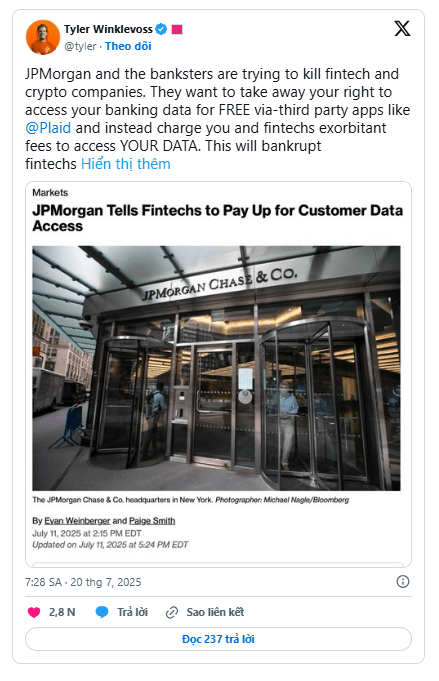Tyler Winklevoss, co-founder of Gemini, accused JPMorgan and other major banks of trying to undermine financial innovation by targeting consumer rights regarding data access. In a June 19 post on X, Winklevoss warned that Wall Street institutions are actively working to dismantle the Consumer Financial Protection Bureau’s “Open Banking Rule.”

JPMorgan Accused of Undermining Open Banking and Cryptocurrency Access
The Open Banking Rule, stemming from Section 1033 of the Consumer Financial Protection Act, empowers consumers to access and share their financial data through third-party applications like Plaid. However, some major banks are reportedly challenging this regulation in court.
Winklevoss believes that this legal battle is not merely a legal dispute. He likens it to an attack on both consumer choice and the progress of cryptocurrency development.
Winklevoss stated: “This will cause fintech companies that help you link your bank accounts with cryptocurrency companies like Gemini, Coinbase, and Kraken to go bankrupt so you can easily deposit into your account with fiat to buy Bitcoin and cryptocurrencies.”
He further argued that JPMorgan's move undermines President Donald Trump's broader goal of making the U.S. the global leader in cryptocurrency and financial innovation.
“Jamie Dimon and his crew are trying to undermine President Trump’s mission to make America the center of innovation and the world’s cryptocurrency capital. We must fight back!” the co-founder of Gemini added.
Notably, Winklevoss's concerns have drawn the attention of cryptocurrency stakeholders. U.S. cryptocurrency-supporting legislator, Senator Cynthia Lummis, reposted his comments, showing political support.
Meanwhile, Arjun Sethi, co-CEO of Kraken, previously expressed similar concerns, warning that the data access fees proposed by JPMorgan are a strategic power grab, not a technological upgrade.
“This is not a technical improvement. It is a fee. And once data becomes a revenue source for the infrastructure provider, the incentive will be to fragment it, lock it up, and sell it at a profit margin. This essentially limits what can be built on top of it,” Sethi emphasized.
Can Cryptocurrency Solve This Problem?
In his post, Sethi compared JPMorgan's approach to cryptocurrency networks, which he believes would reverse the current architecture.
Instead of closed systems, public ledgers provide permissionless access, cryptographic identity, and open-source capabilities. Smart contracts are executed transparently and uniformly across the network, allowing all participants to access data.
“Access is not a business development negotiation. It is a characteristic of the system itself. Smart contracts execute logic predictably across all users. Data resides on a ledger that all participants can access.
Protocols can be built together without obstacles or disputes. Builders do not need to request access, and users do not need to trust a third party to store or release their own information,” Sethi said.
However, Sethi warned that cryptocurrency must maintain its original nature. According to him, if this space replicates the centralized power structures it seeks to disrupt, its transformative promise may fade.
Considering this, he urged the industry to ensure that regulatory progress does not reflect the limitations the industry seeks to escape.
“We should not optimize our defenses through restrictive measures. We should leverage our position and profits to build better access, more open architecture, and more configurable systems. That means investing in protocols, not just platforms. It means engaging in shared infrastructure, not just extracting value from it,” said the CEO of Kraken.
